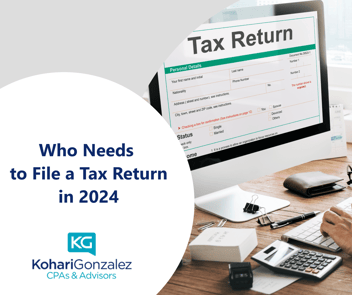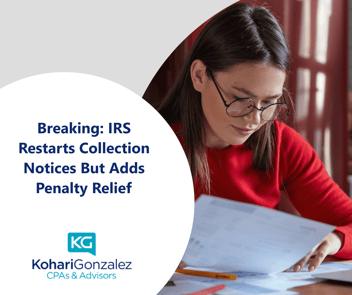 Article Highlights:
Article Highlights:
- Americans Working and Living Overseas
- Requests for Extensions
- Foreign Bank and Financial Accounts (FBAR) Report
- Foreign Financial Assets Statement
- Projected Tax Payments
- Projected Tax Safe Harbors
The deadline date for Americans residing and/or working outside the U.S. to submit their 2024 federal income tax returns as well as for the second anticipated tax payment for 2025 is June 16, 2025.Here are some key points for both.
Americans Living And/or Working Abroad
Although most U.S. taxpayers' 2024 tax returns were due April 15, 2025, an automatic two-month extension applies to U.S. citizens and permanent aliens—i.e., green card holders—and those with dual citizenship residing and/or working outside the United States. For these people, June 16, 2025 is the deadline to submit their 2024 federal income tax returns.
A taxpayer qualifies for the June 16 filing deadline if both their tax home and residence are outside the U.S. and Puerto Rico, or they were serving in the military outside the U.S. and Puerto Rico on the ordinary due date of their return. The reply should contain a remark saying which of the two scenarios applies. Being outside the United States on vacation or owing to a temporary employment assignment on the return due date does not qualify for an extension.
Qualifying taxpayers living and/or working overseas who cannot meet the June 16 deadline may ask for further time to file until October 15 to complete their taxes and avoid the late filing penalty. To prevent disputes with the IRS over whether the extension was timely submitted, taxpayers should electronically submit their extension requests by June 16.Another option is to tick box 8 on Form 4868 to paper file for an extension indicating you are "out of the country. "Whether submitted online or on paper, the extension is just for a filing extension, not an extension to pay your tax due. The extension must to contain a fair estimate of your tax obligation and payment to prevent late payment penalties if it is to be legal. For help completing and submitting an extension, please contact this office.
U.S. Citizens Abroad May Also Need to File an FBAR
U.S. citizens and resident aliens, whether living in the United States or abroad, having a foreign bank or financial account above the threshold mentioned in the next paragraph must submit Form 114, Report of Foreign Bank and Financial Accounts (FBAR). This reporting obligation is distinct from, and in addition to, any reporting needed on Form 1040, Schedule B, or Form 8938. Though filed electronically under Bank Secrecy Act (BSA), the FBAR is not submitted with the IRS.
Taxpayers must submit an FBAR if at any point during 2024 they had interest in, signature or other power over one or more overseas bank accounts whose total value exceeded $10,000.Given this low level, taxpayers with any overseas assets should verify if the FBAR reporting obligation applies to them since the consequences for not filing an FBAR are severe. Though the FBAR due date for 2024 reports was April 15, 2025, FinCEN automatically extends it to October 15, 2025 for anybody who missed that initial deadline.
Apart from submitting an FBAR, certain taxpayers would also have to submit Form 8938, Statement of Foreign Financial Assets. Usually, U.S. citizens, resident aliens and certain nonresident aliens have to declare particular foreign financial assets on Form 8938 if their total worth above specific criteria. Though the person is not obligated to submit an income tax return, the 8938 is not necessary as well.
Estimated Tax Payments
The following 2025 estimated tax payment is likewise due on June 16, 2025 for individuals obligated to make estimated tax payments. Unlike workers, who have income, Social Security, and Medicare taxes deducted from their salaries, self-employed people must prepay their taxes by making quarterly anticipated tax payments. Because the self-employed person has to estimate his or her net earnings for the year and pay taxes on a quarterly basis depending on that estimate, these are called estimated tax payments. Not doing so will lead to interest fines.
Estimated tax obligations affect not just the self-employed but also anybody with income not subject to withholding taxes and even those whose taxes are not adequately withheld. Therefore, if you have income from stock sales, property sales, investments, rental income, alimony from a pre-2019 divorce, partnerships, S-corporations, inherited pension plans, or other sources not subject to withholding, you can also be obliged to pay estimated taxes. Not doing so might lead to an underpayment fine. People who have to pay certain taxes like the 3.8% tax on net investment income or the employment tax on household workers are also affected.
Though termed "quarterly," these payments' covered periods often do not match a calendar quarter.
|
Quarter |
Period Covered |
Months |
Due Date* |
|
First |
January through March |
3 |
April 15 |
|
Second |
April and May |
2 |
June 15 |
|
Third |
June through August |
3 |
September 15 |
|
Fourth |
September through December |
4 |
January 15 |
Should the due date fall on a Saturday, Sunday, or holiday, the payment is due on the next business day.
A de minimis amount payable exemption applies if the tax owed on a return (after withholding and refundable credits) is less than $1,000; an underestimation penalty does not apply. Underpayment fines are levied when the tax payable is $1,000 or higher.
These underpayment fines are calculated quarterly; so, an underpayment in an earlier quarter cannot be compensated for in a later quarter; but, an overpayment in an earlier quarter is carried over to the next quarter.
Estimating one fourth of the taxpayer's annual tax decides the amount of an expected tax installment payment. The IRS offers a unique form on which the underpayment penalty may be calculated depending on real income for the time when the income is seasonal, irregular, or the result of a windfall.
Uncle Sam offers safe-harbor projections for those who still want to avoid the underpayment penalty but who don't want to spend time figuring their quarterly taxes. But even these could be difficult. Usually, a taxpayer may escape an underpayment penalty if his or her withholding and projected payments are equal to or more than:
- 90% of the current year’s tax liability or
- 100% of the prior year’s tax liability.
These safe harbors, meanwhile, don't hold if the adjusted gross income from the previous year exceeds $150,000; in that instance, the safe harbors are:
- 90% of the current year’s tax liability or
- 110% of the prior year’s tax liability.
Occasionally, people having withholdings on certain (but not all) income sources may raise that withholding to make up for the extra revenue sources lacking withholding. Though it could help, withholding changes are less exact than quarterly payments and should be utilized carefully.
This office can help you estimate "quarterly" payments, file your personal tax return and FBAR, modify withholding, and establish safe-harbor payments. Call for help, please.



